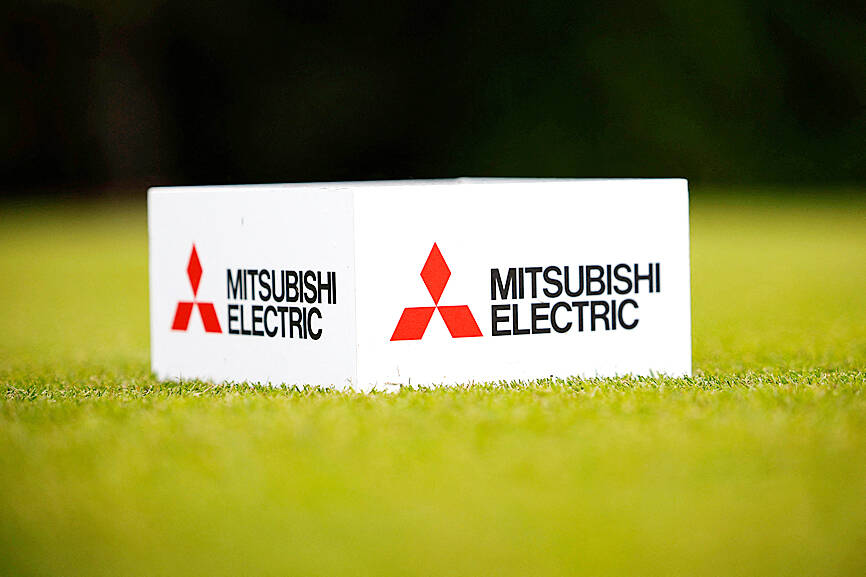Mitsubishi Electric Corp is struggling to meet sustained global demand for optical components used in data centers powering artificial intelligence (AI).
The Tokyo-based maker of factory automation is a key supplier of optic fiber communication devices that link servers to one another. AI’s appetite for high speed and high volume calculations is propelling sales of Mitsubishi Electric’s devices, which boast low power consumption and heat emission, said Masayoshi Takemi, an executive officer in charge of the company’s semiconductor and devices business.
The company next month plans to ramp up production capacity for optical devices to a level 50 percent above last year’s.

Photo: AFP
“But that won’t be enough to meet the strong level of inquiries we’re getting,” Takemi said in an interview. “We may need double what we’ll have in September.”
Mitsubishi Electric controls almost half of the global market for optical transmission devices in data centers, in part because of its electro-absorption modulated laser diodes’ ability to balance both speed and output, the company said.
It would not be an exaggeration to say all US hyperscalers are Mitsubishi Electric customers, Takemi said, without naming clients.
The US is home to some of the world’s biggest hyperscalers — Amazon.com Inc, Microsoft Corp, Alphabet Inc, Meta Platforms Inc and Apple Inc.
The executive’s comments are the latest sign of continued hunger for AI infrastructure, even as investors struggle to price the technology’s impact on companies’ sales.
Demand from the top five data center providers in the US is “very strong” and “still growing,” Takemi said.
Next-generation data centers are operating at speeds of 800 gigabits per second to 1.6 terabits per second, up from previous levels of about 400 gigabits per second, according to optical communications market research firm LightCounting.
Optical devices comprise a tiny part of Mitsubishi Electric’s business, which ranges from factory robots to train systems to power plant controls to satellite equipment. The semiconductor and devices arm earned less than 4 percent of the company’s revenue last fiscal year, with power semiconductors used in industrial machines and electric vehicles making up almost 90 percent of that sliver.
On Japan’s power chip sector, where Mitsubishi Electric competes with domestic rivals Rohm Co and Toshiba Corp, Takemi said he did not see an urgent need for consolidation. China is boosting output of such chips, providing heavy subsidies in a bid to raise its technological self-sufficiency.
Japan has also been beefing up support to boost production of such chips, but concern is growing that the nation could fall behind in a fragmented market.

When an apartment comes up for rent in Germany’s big cities, hundreds of prospective tenants often queue down the street to view it, but the acute shortage of affordable housing is getting scant attention ahead of today’s snap general election. “Housing is one of the main problems for people, but nobody talks about it, nobody takes it seriously,” said Andreas Ibel, president of Build Europe, an association representing housing developers. Migration and the sluggish economy top the list of voters’ concerns, but analysts say housing policy fails to break through as returns on investment take time to register, making the

‘SILVER LINING’: Although the news caused TSMC to fall on the local market, an analyst said that as tariffs are not set to go into effect until April, there is still time for negotiations US President Donald Trump on Tuesday said that he would likely impose tariffs on semiconductor, automobile and pharmaceutical imports of about 25 percent, with an announcement coming as soon as April 2 in a move that would represent a dramatic widening of the US leader’s trade war. “I probably will tell you that on April 2, but it’ll be in the neighborhood of 25 percent,” Trump told reporters at his Mar-a-Lago club when asked about his plan for auto tariffs. Asked about similar levies on pharmaceutical drugs and semiconductors, the president said that “it’ll be 25 percent and higher, and it’ll

NOT TO WORRY: Some people are concerned funds might continue moving out of the country, but the central bank said financial account outflows are not unusual in Taiwan Taiwan’s outbound investments hit a new high last year due to investments made by contract chipmaker Taiwan Semiconductor Manufacturing Co (TSMC, 台積電) and other major manufacturers to boost global expansion, the central bank said on Thursday. The net increase in outbound investments last year reached a record US$21.05 billion, while the net increase in outbound investments by Taiwanese residents reached a record US$31.98 billion, central bank data showed. Chen Fei-wen (陳斐紋), deputy director of the central bank’s Department of Economic Research, said the increase was largely due to TSMC’s efforts to expand production in the US and Japan. Investments by Vanguard International

WARNING SHOT: The US president has threatened to impose 25 percent tariffs on all imported vehicles, and similar or higher duties on pharmaceuticals and semiconductors US President Donald Trump on Wednesday suggested that a trade deal with China was “possible” — a key target in the US leader’s tariffs policy. The US in 2020 had already agreed to “a great trade deal with China” and a new deal was “possible,” Trump said. Trump said he expected Chinese President Xi Jinping (習近平) to visit the US, without giving a timeline for his trip. Trump also said that he was talking to China about TikTok, as the US seeks to broker a sale of the popular app owned by Chinese firm ByteDance Ltd (字節跳動). Trump last week said that he had